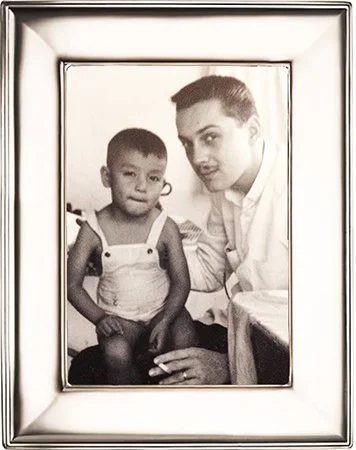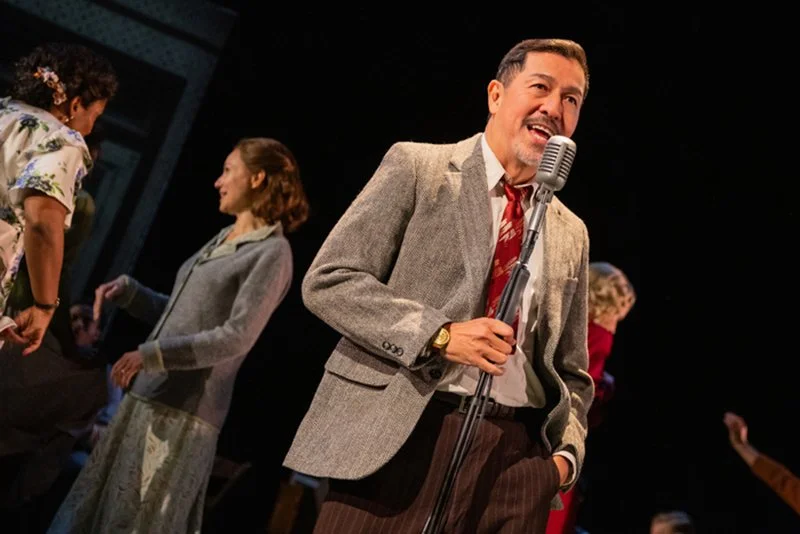Alan Ariano’s Calling
/(L-R) Mi Kang, Taha Mandviwala and Alan Ariano in the National Tour of LIFE OF PI. (Photo by Evan Zimmerman for MurphyMade 2024)
Alan would endorse a novice’s choice of musicals over straight plays. When he was studying at the American Academy of Dramatic Arts in San Diego, he says, “I observed that the alumni who were waiting tables were just actors. The alumni who were working were all in musical theater.”
Musicals were stepping stones into straight plays like the one he’s doing now. He plays Mr. Okamoto and the Captain in the touring company of Life of Pi. The triple Tony Award winner runs through June 1st at the Ahmanson Theatre in Los Angeles before moving to Segerstrom Center for the Arts, June 3rd through 15th.
Alan has worked primarily in New York most of his career but is relocating to Southern California to help take care of his mother, Marilyn, who has Alzheimer’s disease. “Ariano” is a phonetic spelling of his mother’s maiden name of Arellano. He is the youngest of three brothers from a birth father who was gone before he was born. He spent his first five years in the Philippines before his white stepfather, a Navy sailor, brought the family to the United States.
Ariano and his mother Marilyn Zagornik (Photo courtesy of Alan Ariano)
The nomadic life of a stage actor was never new to Alan. “Being adopted into a military family from my stepfather, we traveled to different bases. My mother eventually divorced him and remarried another military gentleman, which again, for that reason, we traveled to Key West, Kansas.”
Ariano and his stepfather, Richard Zagornik, before they moved to the states (Photo courtesy of Alan Ariano)
Finding a Calling Following a Tragedy
In high school, one of his brothers died in a car accident. Around the same time, he discovered acting. “We lived in the San Diego suburb of Chula Vista. Chula Vista High School had a magnet program in performing arts that students from all over the county would audition to attend.”
Alan didn’t need to audition to attend his neighborhood school. Performing arts were for another time. The path to college was littered with obstacles. He knew that his mother, now single, couldn’t afford to send him to college, but he wasn’t discouraged. He earned straight A’s in Advanced Placement classes, took courses at a junior college, and was president of his high school’s debate team. A young man with a plan, he hoped the combination of high grades and making the debate team his extracurricular would qualify him for college scholarships.
Halfway through his senior year, he had collected the necessary credits to graduate early. The sponsoring teacher of the debate team happened to be the drama teacher. She urged him to stick around for a drama class. Without any acting experience, he auditioned and would have landed the lead had the role not required him to be one of the students who had auditioned to enter the performing arts program. He accepted an understudy role.
At San Diego State University, he aimed for a degree in Architectural Engineering. His high school drama teacher had by then, become his mentor. She thought he should audition at the Lyric Theatre in San Diego. “You clearly have natural ability,” he recalls her advice. “It was an equity production of Westside Story.”
Once he booked the role of Chino, a dangerous member of the Sharks, his engineering ambitions evaporated. He transferred from San Diego State University to American Academy of Dramatic Arts before graduating with a theater degree from United States International University (now Alliant University), all San Diego campuses. After college, he auditioned for Opera Pacific’s touring company of Westside Story. He didn’t get the role, but his story didn’t end there.
“They called me and said, we lost our Chino. We’d like you to replace him at the Orange County Performing Arts Center (now Segerstrom Center for the Arts).” But he still wasn’t sure. “I said I’m not Equity.” Opera Pacific required membership in the Actors’ Equity Association, which is the actors’ union.
“They said, well, we will buy you your Equity card, and you can join us in rehearsals. And that’s how I got my Equity card.” Broadway became his oyster, and that union card pried open the shell to the pearls to come.
“I observed that the alumni who were waiting tables were just actors. The alumni who were working were all in musical theater.”
‘Miss Saigon’
Despite his training and the original production of M. Butterfly on his resumé, he wasn’t an automatic lock for Miss Saigon, and he added an extra degree of difficulty. “I went to an open call even though I had an agent. I wanted to experience an open call.” He recalls, “At the open call, they announced if you can’t sing a G (music note), you don’t need to audition because the men have to sing high notes. I’m a baritone, so I left.”
His Broadway career didn’t end with that inauspicious beginning. “Miss Saigon’s music director decided to test my range. We went to the piano, and I sang along with his scales.” The music director gave him the proverbial offer he couldn’t refuse. “He said, Alan, you don’t realize this, but you have those notes. He gave me the number of a voice teacher. He said, he’ll help you with your range, and we’ll see you in six or eight months.”
Despite the voice lessons that lay ahead, Alan was thrilled because he knew he had a callback. “Eight months later, I did get called for final callbacks.” He says, “When people ask me who are you in Miss Saigon, I say, Third Asian from the right.”
Alan never waited tables, but he has performed in straight plays, such as Life of Pi in which he also contributes light puppetry. In 1999, he was a familiar face in Law and Order: Special Victims Unit, among other television shows. But he hasn’t turned the page on a musical theater career.
One of his favorites has been the complex role of Dr. Walker in Girl from the North Country. The show is admired for Irish playwright Conor McPherson’s weaving of Bob Dylan songs into a Great Depression era saga. Like the Mr. Okamoto character in Life of Pi, Dr. Walker fills a narrative role that takes the form of a flawed yet effective authority figure. McPherson noticed this essential persona in Alan. “He told me when he looks at me, he sees gravitas. I don’t even need to open my mouth.”
Ariano as Dr. Walker in Girl from the North Country (Photo by Evan Zimmerman)
Ariano (right) with Girl From the North Country Writer-Director Conor McPherson (Photo courtesy of Alan Ariano)
That anointing by the esteemed playwright was well earned through over five decades of annealing and sculpting by tragedy, betrayal, perseverance, and serendipity. The four touchstones also inform Life of Pi.
Anthony Maddela covers a variety of subjects for Positively Filipino. He worked previously in Watts Los Angeles for the Housing Authority of the City of Los Angeles. He freelances as a grant writer and does some creative writing. He was born and raised in Seattle and has lived most of his life in Los Angeles.






